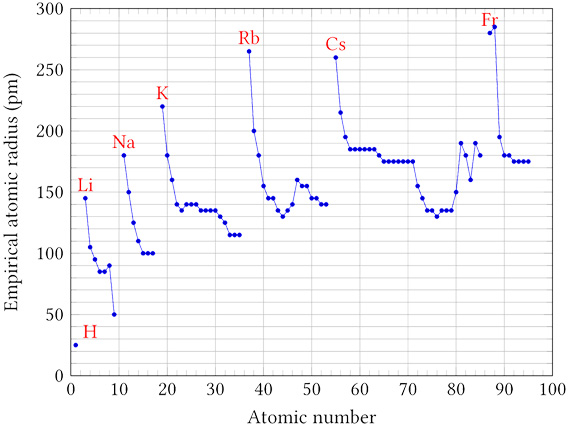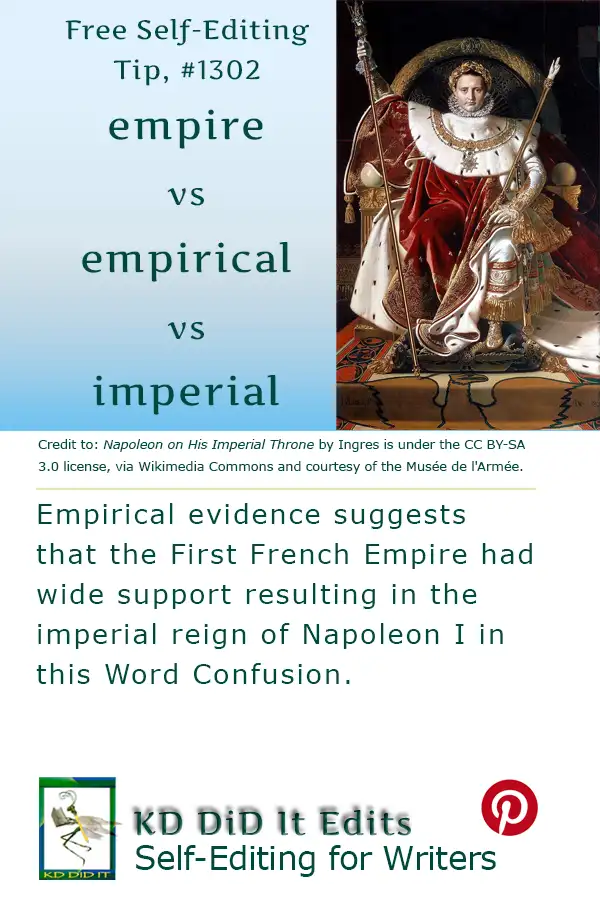I was mostly curious about the difference between an empire and an imperial, then empirical cropped up. It made sense to add this last to this word confusion.
Empire is similar to imperial in that both refer to sovereignty and control, but after that, the two diverge.
Empire also refers to a design style (adjective) while the noun is all about absolute control. Oh, and an apple.
Imperial begins with relating to empire — its manners, members, and military forces, and it also goes on to refer to qualities, sizes, and measurements; architecture; and, facial hair, etc.
Word Confusions . . .
. . . started as my way of dealing with a professional frustration with properly spelled words that were out of context in manuscripts I was editing as well as books I was reviewing. It evolved into a sharing of information with y’all. I’m hoping you’ll share with us words that have been a bête noire for you from either end.
If you found this post on “Empire vs Empirical vs Imperial” interesting, consider subscribing to KD Did It, if you’d like to track this post for future updates.
| Empire | Empirical | Imperial |
|---|---|---|
 |

Empirical Atomic Radius Trends is Francois~frwiki own work and is under the CC BY-SA 4.0 license, via Wikimedia Commons. |

Russian Imperial Family, 1913, Livadiya, Crimea, by Boasson and Eggle is in the public domain. |
| Part of Grammar: | ||
| Adjective 1; Noun 2, 3
Plural for the noun: empires |
Adjective | Adjective 1; Noun 1, 2
Plural for the noun: imperials |
| Adjective: [Attrib.; usually Empire] Denoting a style of furniture, decoration, or dress fashionable during the First or (less commonly) the Second Empire in France 1 Noun:
Imperial or imperialistic sovereignty, domination, or control [Commerce] An extensive enterprise under a unified authority
A variety of apple having dark red skin and white flesh 3 |
Adjective: Based on, concerned with, or verifiable by observation or experience rather than theory or pure logic [Medicine; of medical treatment] Based on practical experience rather than scientific proof [Philosophy; of knowledge] Derived from experience rather than by logic from first principles
[Medicine] Of or relating to medical quackery [Statistics] The posterior probability of an event derived on the basis of its observed frequency in a sample |
Adjective: Relating to an empire 1
Relating to or denoting the system of nonmetric weights and measures (the ounce, pound, stone, inch, foot, yard, mile, acre, pint, gallon, etc.) formerly used for all measures in the UK, and still used for some [Mainly historical; of a size of paper] Measuring roughly 559 x 762 mm (22 x 30 inches British; 23 x 31 inches US and Canadian) Noun:
A member of an imperial family, especially an emperor or empress
An article of exceptional size or quality Of a commanding quality, manner, aspect, etc. Domineering
Any of various book sizes:
A Russian gold coin originally worth ten roubles [US] The top of a carriage, such as a diligence [US] A luggage case carried on top of a carriage [Architecture] A dome that has a point at the top An oversized bottle used especially for storing Bordeaux wine, equivalent to 8 regular bottles (6 l. or 6.6 qt.) [Also royale or impériale] A narrow pointed beard extending from the chin 2 |
| Examples: | ||
| Adjective: The Empire style was neoclassical but marked by an interest in Egyptian and other ancient motifs probably inspired by Napoleon’s Egyptian campaigns. Charles Percier and Pierre-François-Léonard Fontaine were major exponents of the Empire style. Emblems, such as the golden eagle, classical palm leaves, and laurel wreaths were typical of Empire design. Noun: He encouraged the Greeks in their dream of empire in Asia Minor. “In pre-Columbian America, the Inca Empire was ruled by a Sapa Inca, who was considered the son of Inti, the sun god and absolute ruler over the people and nation” (Absolute). She established a thriving publishing empire. Apple, Amazon, and McDonald’s have established a global empire. Each ministry, each department, had its own empire, its own agenda, and worked to protect its turf. Have you tried those Empire apples yet? |
Adjective: They provided considerable empirical evidence to support their argument. Their empirical results prove the theory. “No empirical data support his claim that the birth of a baby with Down syndrome makes the world — or the baby — unhappier” (Picciuto). “It is at best an empirical test and must be interpreted in the light of clinical symptoms” (Todd). “Empirical knowledge (a posteriori) empirical evidence, also known as sense experience, is the knowledge or source of knowledge acquired by means of the senses, particularly by observation and experimentation” (Knowledge). “Empirical laws theories are generally approached from the perspective of probability rather than absoluteness” (Miller & Berger). In the Middle Ages and the Renaissance, healers used empirical knowledge to cure the sick. “Empirical probability is based on a ratio of the number of attempts of a task to the number of a specific result, e.g., coin tosses to the number of heads or tails achieved” (Halton). |
Adjective: Britain’s imperial era ranged between 1815 and 1914. The imperial Romanov family was murdered in 1918. The bedroom is huge and imperial. He had the imperial manner down pat. She looked quite imperial. The party and its autocratic — many would say imperial — ways. “The imperial system has a hundredweight, defined as eight stone of 14 lb each, or 112 lb (50.80234544 kg), whereas a US hundredweight is 100 lb (45.359237 kg)” (Comparison). Imperial-sized paper is primarily used by artists and is known as full sheet in the US. Noun: We’re taking a tour of the imperial palace. “Russia, Italy, Germany, the United States, and Japan became imperial powers in the period from the middle of the 19th century to World War I” (Editors). P.J. Ridout, a former member of the Imperial Fascist League, founded the British Empire Party in the early 1950s. “The son of the Emperor who is the Imperial Heir is called Kotaishi (Crown Prince)” (Household). The Imperial Plum is a great long reddish plum, very waterish. That’ll be ten imperials. Throw their imperials up on the imperial of the diligence. The imperial dome took up much of the skyline, and it has since been filled with these buildings. The difference between an imperial octavo and an imperial quarto is how many folds, leaves, and pages one can get from a sheet of paper. The Imperial holds the same amount as the Methuselah, but their shapes are different. A type of goatee, the imperial beard is a mustache with a disconnected chin patch. |
| Derivatives: | ||
| Noun: empire-building | Adjective: antiempirical, empiric, nonempirical, overempirical, semiempirical, unempirical Adverb: empirically Noun: empiric, empiricalness |
Adjective: imperialist, imperialistic Adverb: imperially, imperialistically Noun: imperialist Verb: imperialise (British), imperialize |
| History of the Word: | ||
|
It was first recorded in 1560–70, empiric + -al. |
|
C’mon, get it out of your system, bitch, whine, moan . . . which words are your pet peeves? Also, please note that I try to be as accurate as I can, but mistakes happen or I miss something. Email me if you find errors, so I can fix them . . . and we’ll all benefit!
Satisfy your curiosity about other Word Confusions on its homepage or more generally explore the index of self-editing posts. You may also want to explore Book Layout & Formatting Ideas, Formatting Tips, Grammar Explanations, Linguistics, Marketing Help & Resources, Publishing Tips, the Properly Punctuated, Writing Ideas and Resources, and Building Your Website.
Resources for Empire vs Empirical vs Imperial
Some of these links may be affiliate links, and I will earn a small percentage, if you should buy it. It does not affect the price you pay.
“Absolute Monarchy.” Wikipedia. 5 July 2024. Accessed 20 July 2024. <https://en.wikipedia.org/wiki/Absolute_monarchy>.
Apple Dictionary.com
Collins Dictionary: imperial
“Comparison of the Imperial and US Customary Measurement Systems.” Wikipedia. 11 June 2024. Accessed 20 July 2024. <https://en.wikipedia.org/wiki/Comparison_of_the_imperial_and_US_customary_measurement_systems>.
Dictionary.com: empirical
The Editors. “Imperialism Summary.” Encyclopedia Britannica. 21 Dec 2021. Accessed 20 July 2024. <https://www.britannica.com/summary/imperialism>.
“Empirical Knowledge.” Wikipedia. 29 Sept 2021. Accessed 20 July 2024. <https://en.wikiquote.org/wiki/Empirical_knowledge>.
The Free Dictionary: empire, empirical, imperial
Halton, Clay. Macroeconomics. Economics. “Empirical Probability: What It is, How It Works, FAQ.” Investopedia. 19 July 2024. Accessed 20 July 2024. <https://www.investopedia.com/terms/e/empiricalprobability.asp>.
The Imperial Household Agency. “The Imperial Family.” Kunaicho.go.jp. n.d. Accessed 20 July 2024. <https://www.kunaicho.go.jp/e-about/seido/seido02.html>.
“Imperial Roman Army.” Wikipedia. 7 July 2024. Accessed 20 July 2024. <https://en.wikipedia.org/wiki/Imperial_Roman_army>.
Miller & Berger quote. “Empirical Laws Paradigm.” Lumen Learning.com. n.d. Accessed 20 July 2024. <https://courses.lumenlearning.com/suny-introductiontocommunication/chapter/empirical-laws-paradigm/>.
Picciuto, Elizabeth. “Richard Dawkins Would Fail Philosophy 101.” The Daily Beast. 28 Aug 2014. Last updated 14 Apr 2017. Accessed 20 July 2024. <https://www.thedailybeast.com/richard-dawkins-would-fail-philosophy-101>.
Todd, James Campbell. A Manual of Clinical Diagnosis. Originally published 1908. Project Gutenberg, 2014. <https://www.gutenberg.org/files/47078/47078-h/47078-h.htm>. Ebook.
Pinterest Photo Credits
Napoleon on His Imperial Throne by Ingres is under the CC BY-SA 3.0 license, via Wikimedia Commons and courtesy of the Musée de l’Armée.


